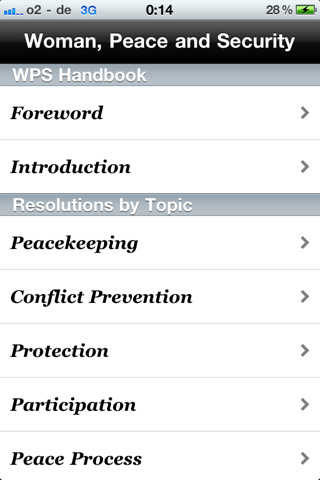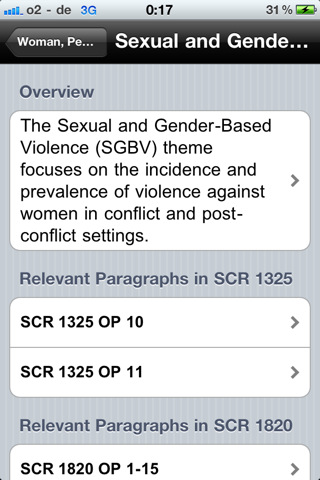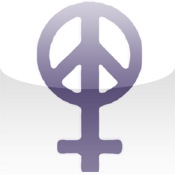CSW 55 and Taking on Technology
This 122 edition of PeaceWomen ENews features women, peace and security news, events and resources from peacewomen.org.The last PeaceWomen ENews focused on setting an active agenda for women's advocates in the new year (click here for full version).
This year's CSW falls at a time of great change. As I write this, there are uprisings in many cities of the Middle East and North Africa where women and men are demanding justice, freedom and equality. Through the images of people gathering to voice their demands in Egypt, we are witnessing the creation of a new era ushered in by courageous multitudes calling for an end to unjust and repressive regimes dominated by power, and for the restoration of real human security based on human dignity. Women are playing a fundamental role in the revolution, and must be included in reconstruction and future decision-making. We stand in solidarity with these women insisting on freedom, and we are inspired to reaffirm our commitment to the beliefs of our founding sisters of WILPF (also see recent WILPF statement and news articles below).
Also in recent weeks, Southern Sudan witnessed momentous change. After a historic referendum, the people voted to secede from the North and become the world's newest sovereign state. Overwhelmingly, the South Sudanese population that voted favoured separation (98.83 per cent in favor.). We, at PeaceWomen and WILPF, salute the efforts of women in Sudan and the region working to bring about change through peaceful, non-violent, participatory action. See featured news below or check our Sudan page of the News Portal for recent updates.
Next to the mass gatherings in Egypt and the historic vote in South Sudan is the 2011 Commission on the Status of Women (CSW 55) where thousands of women assemble at the UN HQ from February 22 to March 4, 2011. Indeed, the women's rights community anticipates the first CSW led by the new UN entity, UN Women, but is wary of the first CSW with severe new registration rules that limit access for NGOs.
The CSW 55 priority theme--“Access and participation of women and girls in education, training, science and technology, including for the promotion of women's equal access to full employment and decent work”--resonates at the heart of what we do in WILPF. Here at PeaceWomen, in particular, we understand the power of education and technology. Our project harnesses technology and stretches a small budget to connect women around the world working on women's rights and equality, and particularly on women, peace and security issues.
For example, PeaceWomen re-launched our website last year to make our online portal and resources more accessible and user-friendly, and to advance accountability through online monitoring tools (such as Security Council Monitor, UN Implementation, Member State Commitments). We also proudly launched the first ever Women, Peace and Security iPhone application, a version of our WPS handbook, which was supported by Liechtenstein and Switzerland. The iPhone app could not have happened without the innovation and creativity of Swen Dornig (Liechtenstein)! (Thank you, Swen, for pushing the boundaries of how we make Women, Peace & Security language accessible to policy-makers.)
The Women's International League for Peace and Freedom (WILPF) will continue our engagement in the CSW including:
· WILPFs partnership with UN Women and OneVoice.org to discuss “Gender, Technology & Peacebuilding: Bridging the Israel-Palestine Divide,” February 22nd (lunchtime). Rsvp required.
· WILPFs partnership with Global Action to Prevent War (GAPW) and Soka Gakk to host a reception and discussion on peace activism and women's leadership, Feb 24th (6:30pm), with Felicity Hill and Nyaradzayi Gumbonzvanda. All are welcome
· WILPFs statement that was submitted to the CSW is available here online (ref: E/CN.6/2011/NGO/49). The statement is co-authored with Femmes Afrique Solidarité, International Association of Lawyers Against Nuclear Arms and WILPF.
· WILPF-US facilitation of the weeklong 2011 Practicum in Advocacy, which brings women from universities to CSW, among other important initiatives.
· PeaceWomen.org's monitoring tools will bring the CSW activities in New York to women, peace and security advocates more broadly. We have developed CSW focused web pages and have included here links to these and other useful CSW resources and events.
Over the years, a measure of commitment to gender equality has been the level of women's equal participation and advocacy opportunities. The annual CSW is an opportunity for activists to access and call for governments and the UN to implement their previous commitments. But, as I noted, NGOs have been seriously constrained by the new UN rules, which allocate only 20 places for each organisation. We cannot seriously discuss improving access and equality when the CSW is being detrimentally changed. Nevertheless, thousands of women have registered and will be present at UN HQ, even while the accessibility of UN events remains up in the air.
Finally, featured in our Resources this month is a new book by former WILPF Secretary General Barbara Lochbihler called “Listen to Women for a Change: 15 Years after the Beijing Conference on Women – 15 Years after the Peacetrain: Balances and Outlooks” with a chapter on Women, Peace and Security.
Photo above:Women of the Egyptian Revolution(Mortada)
WILPF & World YWCA Meet with CEDAW Committee on Rights, Peace, Security
 The World YWCA and the Women's International League for Peace and Freedom (WILPF) met with the United Nations CEDAW Committee in January to discuss recommendations for a stronger link between the CEDAW reporting process, human rights and the peace and security agenda. Both organizations called for promotion of women's roles in implementation of the three pillars of UNSCR 1325: prevention, protection, and participation.
The World YWCA and the Women's International League for Peace and Freedom (WILPF) met with the United Nations CEDAW Committee in January to discuss recommendations for a stronger link between the CEDAW reporting process, human rights and the peace and security agenda. Both organizations called for promotion of women's roles in implementation of the three pillars of UNSCR 1325: prevention, protection, and participation.
Specific recommendations made to the CEDAW Committee included:
- That CEDAW monitoring mechanisms integrate a stronger and more rigorous approach to women's rights promotion, protection and fulfillment in situations of conflict and post conflict.
- That CEDAW monitoring and reporting processes have a stronger role in advancing sexual and reproductive health rights and HIV as critical issues related to the discrimination against women, and to monitor how budgets are allocated to these issues, particularly in conflict and post conflict situations.
- To continue to strengthen collaboration and partnership with civil society organisations, and especially women's rights organisations, in exploring approaches and methodologies for a stronger link between CEDAW, Peace and Security mechanisms and HIV.
To learn more details about the meeting, click here.
Zainab Salbi: Women, Wartime and the Dream of Peace
Zainab Salbi speaks at TED Women conference. AT TEDGlobal 2010, Zainab Salbi tells powerful "backline" stories of women who keep everyday life going during conflicts, and calls for women to have a place at the negotiating table once fighting is over. To see more inspiring videos from TED Women Conference, click here>>
Global Day of Action on Military Spending: Go Figure: What Would it Cost to Save the World?
WILPF is supporting the organization of a Global Day of Action on Military Spending on April 12, 2011 to coincide with the release of the Stockholm International Peace Research Institute's annual report, which will take into account the new figures on military expenditures. On this day, people all over the world will join together in joint actions to focus public, political, and media attention on the costs of military spending and the need for new priorities. To read more about the campaign, click here>>
55th Session of the Commission on the Status of Women
 The 55th Session of the Commission on the Status of Women will take place at United Nations Headquarters in New York from Tuesday, 22 February to Friday, 4 March 2011. The theme of this session is “Access and participation of women and girls in education, training, science and technology, including for the promotion of women's equal access to full employment and decent work.”
The 55th Session of the Commission on the Status of Women will take place at United Nations Headquarters in New York from Tuesday, 22 February to Friday, 4 March 2011. The theme of this session is “Access and participation of women and girls in education, training, science and technology, including for the promotion of women's equal access to full employment and decent work.”
NGO Parallel Events Schedule
|
February / March 2011 |
||||||
|
Monday |
Tuesday |
Wednesday |
Thursday |
Friday |
||
|
21 |
||||||
Peace Women monitors events and resources specifically related to the women, peace and security agenda. We will also provide basic documents and reports, outcome documents as well as publicize parallel events. For more information click on our UN monitoring, CSW 55th session section. For other relevant information see CSW Website and NGO-CSW Website.
Open Debate on Post-Conflict Peacebuilding: Institution Building
On 21 January 2011, the Security Council held an Open Debate on Post-Conflict Peacebuilding: Institution Building. The debate featured 45 statements including from the Secretary-General, the permanent and nonpermanent members of the Council, the Chair of the Peacebuilding Commission (PBC), and twenty-eight other delegations (including the European Union, African Union and G7+ coalition of fragile states). The Security Council adopted Presidential Statement S/2011/2, which Bosnia and Herzegovina delivered as President this month of the Council. The Statement did not include any reference to women and/or gender. The general themes of the debate were largely limited to traditional themes of national ownership and coordination between international and national actors. Of the 45 statements made in the Council, 24 referenced women and/or gender.
Statements were delivered by SG Ban Ki-Moon, the PBC, Timor-Leste, the United States, the United Kingdom, Germany, France, South Africa, China, Russia, Columbia, Brazil, Lebanon, Nigeria, India, Gabon, Portugal, Bosnia and Herzegovina, Belgium, Egypt, Turkey, Costa Rica, Croatia, Afghanistan, Uganda, Morocco, Japan, New Zealand, the Republic of Korea, Peru, Nepal, Mexico, Australia, Armenia, Ukraine, Bangladesh, Slovenia, Serbia, Benin, Pakistan, Tanzania, Botswana, Argentina, the European Union, and the African Union.
(Note: Bolded names represent those who included gender/women in their statements)
Download: Women, Peace & Security Handbook iPhone/iPad/iTouch App
***New*** PeaceWomen/WILPF launched the FIRST ever Women, Peace and Security iPhone Application!!!!!!!
The app is based on the Women, Peace and Security Handbook we produced for the 10th anniversary of 1325. Divided into thirteen thematic chapters, the Women, Peace and Security App is a reference guide for both progress made and action to be taken on the Women, Peace and Security agenda. The App examines the consistency with which UN Security Council incorporated the language and intent of its Women, Peace and Security agenda in its country-specific resolutions over the past 10 years. For diplomats this App will provide good-practice extracts from previous resolutions and give critical recommendations for future negotiations. For the UN system this App will provide easy access to the various obligations that derive form the WPS agenda.
Screen Shots





